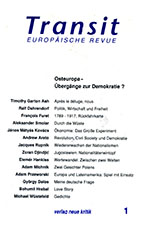Übergänge: Politik, Wirtschaft und Freiheit
Transitions: Politics, Economy and Freedom
Author(s): Ralf DahrendorfContributor(s): Udo Rennert (Translator)
Subject(s): Civil Society, Politics and society, History of Communism, Post-Communist Transformation
Published by: Institut für die Wissenschaften vom Menschen
Keywords: transition; Solidarnosc; Vaclav Havel; end of Communism; Democracy;
Summary/Abstract: The answer to an illiberal state - be it a country in real socialism or a dictatorship, a fascist or any other authoritarian regime - is democracy. The meaning of this term is often less clear. What exactly did the students in Beijing and Shanghai have in mind when they called for democracy? What did the opposition want in Santiago de Chile and what did the opposition expect in Warsaw? They all want the population to have a political say, particularly through elections. They want alternatives to the government in power. They want freedom of speech and assembly. They want an end to arbitrariness, arrests without trial, torture of any kind. In other words, "democracy" stands for a mixture of the rule of law and the political rights that are normally associated with the constitution of free countries. Even though those who demand democracy in illiberal states often assert that they do not intend to make their country a reflection of the United States or a second Great Britain, this does not change the fact that these two countries serve as models for their imaginations.
Journal: Transit
- Issue Year: 1990
- Issue No: 01
- Page Range: 35-47
- Page Count: 13
- Language: German

